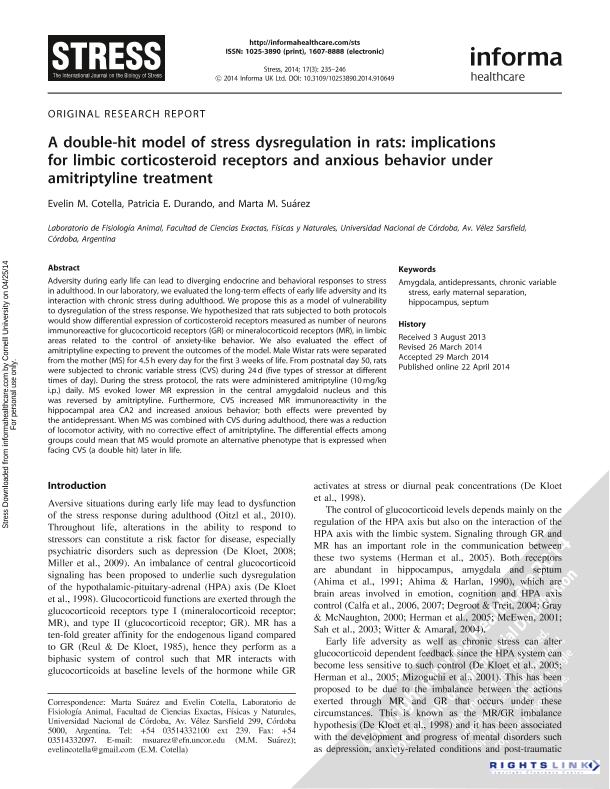Artículo
A double-hit model of stress dysregulation in rats: implications for limbic corticosteroid receptors and anxious behavior under amitriptyline treatment
Fecha de publicación:
05/2014
Editorial:
Taylor & Francis Ltd
Revista:
Stress
ISSN:
1025-3890
Idioma:
Inglés
Tipo de recurso:
Artículo publicado
Resumen
Adversity during early life can lead to diverging endocrine and behavioral responses to stress in adulthood. In our laboratory, we evaluated the long-term effects of early life adversity and its interaction with chronic stress during adulthood. We propose this as a model of vulnerability to dysregulation of the stress response. We hypothesized that rats subjected to both protocols would show differential expression of corticosteroid receptors measured as number of neurons immunoreactive for glucocorticoid receptors (GR) or mineralocorticoid receptors (MR), in limbic areas related to the control of anxiety-like behavior. We also evaluated the effect of amitriptyline expecting to prevent the outcomes of the model. Male Wistar rats were separated from the mother (MS) for 4.5 h every day for the first 3 weeks of life. From postnatal day 50, rats were subjected to chronic variable stress (CVS) during 24 d (five types of stressor at different times of day). During the stress protocol, the rats were administered amitriptyline (10 mg/kg i.p.) daily. MS evoked lower MR expression in the central amygdaloid nucleus and this was reversed by amitriptyline. Furthermore, CVS increased MR immunoreactivity in the hippocampal area CA2 and increased anxious behavior; both effects were prevented by the antidepressant. When MS was combined with CVS during adulthood, there was a reduction of locomotor activity, with no corrective effect of amitriptyline. The differential effects among groups could mean that MS would promote an alternative phenotype that is expressed when facing CVS (a double hit) later in life.
Archivos asociados
Licencia
Identificadores
Colecciones
Articulos(INIMEC - CONICET)
Articulos de INSTITUTO DE INV. MEDICAS MERCEDES Y MARTIN FERREYRA
Articulos de INSTITUTO DE INV. MEDICAS MERCEDES Y MARTIN FERREYRA
Citación
Durando, Patricia Evelina; Cotella, Evelin Mariel; Suarez, Marta Magdalena; A double-hit model of stress dysregulation in rats: implications for limbic corticosteroid receptors and anxious behavior under amitriptyline treatment; Taylor & Francis Ltd; Stress; 17; 3; 5-2014; 235-246
Compartir
Altmétricas




